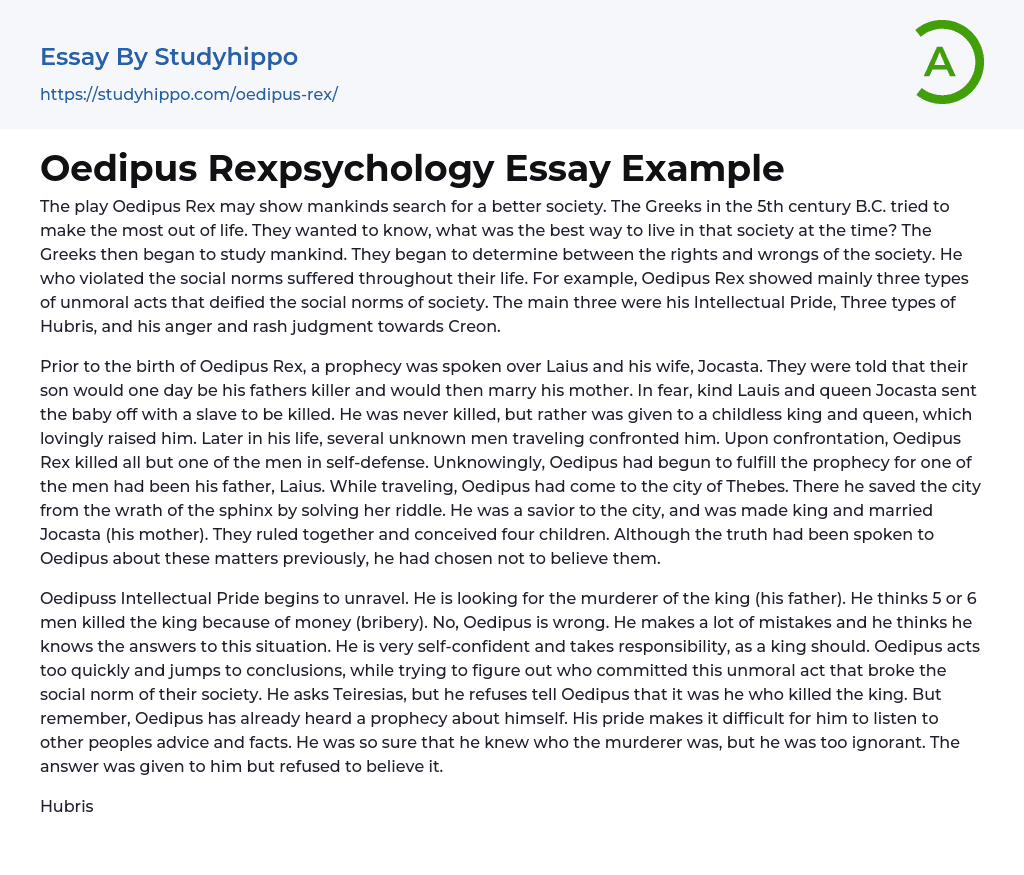The play Oedipus Rex illustrates mankind's search for a better society. In the 5th century B.C., the Greeks sought to maximize their lives and understand the optimal way to live within their society. They delved into the study of humanity and started distinguishing right from wrong in their society. Those who transgressed social norms experienced lifelong suffering. Oedipus Rex exemplified three types of immoral actions that defied the societal norms: Intellectual Pride, various forms of Hubris, and anger and hasty judgments towards Creon.
Prior to the birth of Oedipus Rex, Laius and Jocasta received a prophecy that their son would kill his father and marry his mother. Fearing this fate, they arranged for their baby to be killed by sending him away with a slave. However, instead of being killed, the baby was given to a chi
...ldless king and queen who raised him lovingly. As an adult, while on a journey, Oedipus Rex encountered several unknown men whom he unintentionally killed in self-defense - one of them being his own father, Laius. While traveling further, Oedipus arrived in Thebes where he saved the city from the sphinx's wrath by solving her riddle. Consequently, he became a hero and was crowned as king. Unknowingly, he also married Jocasta who turned out to be his mother. Together they ruled Thebes and had four children. Despite having prior knowledge of the truth, Oedipus chose not to believe it.
Oedipus's downfall stems from his pride and arrogance as he embarks on a quest to uncover the murderer of his father. He firmly believes that several individuals were motivated by bribery, thus confidently assuming he knows the truth. In his haste and
impulsiveness, Oedipus tries to reveal the identity of the immoral culprit who defied societal norms. While consulting with Teiresias for answers, Oedipus is told that he himself is the killer, but he refuses to accept it. It is important to note that Oedipus has already been informed about a prophecy regarding his own fate. Unfortunately, his ego prevents him from listening to advice or accepting facts from others. Even though the truth is within reach, Oedipus foolishly denies its existence.
Hubris plays a pivotal role in Oedipus' character as he uncovers three areas that demonstrate his arrogance and defiance towards the gods and moral laws. Firstly, Oedipus commits murder and engages in incest, an act that mocks the gods. Despite the belief in higher powers, Oedipus looks down on the gods after solving the riddle of the sphinx and claiming sole credit. Secondly, he insults the gods by proclaiming that he does not need them in his life, committing blasphemy. Lastly, his anger leads him to disrespect Teiresias, calling him a wicked old man. Oedipus' hubris subjects him to great Nemesis, a punishment for going against the gods. Failing to heed the warnings, his life becomes a nightmarish existence, regretting the unmentionable acts of murdering his father and marrying his mother, acts considered abominable and criminal in a traditional society.A person engaging in murder and incest is deemed a criminal. Oedipus resided in a state of self-pity, ultimately gouging out his own eyes, unable to bear his own existence.
Oedipus Rex exhibits anger and impulsive decision-making towards his brother-in-law, Creon. This anger, along with his intellectual pride and hubris, serves as another flaw in Oedipus' character. Despite
Creon's unwavering loyalty to Oedipus, he is accused of murder by him. In response, Creon defends himself using reasoning and demonstrates his aversion to chaos, proving himself a true friend to Oedipus. Nevertheless, Oedipus releases his anger and condemns Creon as evil.
Furthermore, Oedipus asserts that he will always possess power as a good or bad king; acting like a dictator who refuses to listen to his people. Adding to this authoritarian behavior, he threatens anyone who dares question him. As a result of these actions, his wife tragically commits suicide by hanging herself in a room discovered by Oedipus with bleeding eyes.
While initially blaming the people of Apollo for these acts, Oedipus eventually acknowledges that he alone is responsible for them. His intellectual pride, hubris, anger, and impulsive decision-making ultimately lead him to face the consequences of his deeds. These actions are so wicked that they defy all laws of humanity; thus he takes full responsibility for them.
In my opinion:
The one who laughs first has failed to understand the joke.
English Essays
- Abnormal Psychology essays
- Social Psychology essays
- Developmental Psychology essays
- Jean Piaget essays
- Positive Psychology essays
- Classical Conditioning essays
- Counseling essays
- Psychoanalysis essays
- Educational Psychology essays
- Behaviorism essays
- Authority essays
- Operant Conditioning essays
- Maslow's Hierarchy Of Needs essays
- Mental Health essays
- Personality Psychology essays
- Psychotherapy essays
- Family Therapy essays
- Stanford Prison Experiment essays
- Abraham Maslow essays
- Erik Erikson essays
- Cognitive Psychology essays
- Sigmund Freud essays
- Attachment Theory essays
- Supersize Me essays
- Individual essays
- Infant essays
- Childhood essays
- Adolescence essays
- Growth Mindset essays
- Is Google Making Us Stupid essays
- Childhood Memory essays
- Positive Attitude essays
- Reinforcement essays
- Archetype essays
- Maturity essays
- Deception essays
- Certainty essays
- Conformity essays
- Aggression essays
- Behavior essays
- Human Behavior essays
- Obedience essays
- Adult essays
- Procrastination essays
- Morality essays
- Altruism essays
- Human Sexuality essays
- Role Model essays
- Perseverance essays
- Expressive essays




